
Welcome to the latest in a series of AIChE blog posts profiling process engineers, a diverse group of professionals spanning multiple industries and regions. In this series, we profile process engineers who work in fields as diverse as petrochemicals, pharma, bulk chemicals, food, and any process-intensive industry.
Are you a member and process engineer interested in being profiled? We'd love to hear from you via this volunteer opportunity. Please also check out our online discussion group specifically for process engineers. You can find out about these initiatives and join our efforts by visiting https://www.aiche.org/processengineering
This month, we introduce you to Shahzeb Hassan. He is a graduate of NED University of Engineering and Technology and is currently an executive process engineer at Pakistan Refinery Limited. He discusses his various responsibilities within the plant, the leadership role of process engineers, and what it takes to perfect his craft.
Tell us a bit about your work as a process engineer.
In the last year, I completed projects that could be considered low-hanging fruits. These include the installation of a new state-of-the art, fully automated softening unit and the commissioning of a process direct-fired boiler. For monitoring and measuring the performance of process units, I prepare a fact sheet containing all the process unit KPIs on a daily basis.
Process simulation and modeling is also an integral part of our daily routine work for the optimization of processes, along with the verification of proposed changes and design before its implementation at site. I am also a part of the catalyst regeneration team responsible for planning and executing regenerations safely.
Diversified experience, passion, and an understanding of basic chemical engineering principles are all required to excel in this field. I wanted to become a process engineer because of my good problem-solving skills and interest in simulation software.
I also participate in the technical evaluation panel meetings for the evaluations of Proposed MOC’s. I am actively involved in the HAZOP of process units.
Additonally, I spend a lot of time evaluating vendor proposals related to process equipment and chemical supplies.
Last but not least, I mentor and monitor the performance of junior employees to ensure efficiency in process engineering and I deliver lectures at the university level on process engineering topics.
Why did you become a process engineer?
A process engineer is the core player of process industries. Without process engineering leadership, the team itself could not be achieved. When forming a good team, I think it's important to note that optimization and cost savings should be the two main objectives, although they can also prove to be the most challenging ones.
Diversified experience, passion, and an understanding of basic chemical engineering principles are all required to excel in this field. I wanted to become a process engineer because of my good problem-solving skills and interest in simulation software. I have been using process simulation software since the second year of my bachelor's degree.
As a process engineer, I experience how to troubleshoot plant problems. When there is no apparent solution to the problem, my job is to come up with flexible solutions that everyone can agree upon. This is a very important shade or aspect of a process engineer.
What are some of the biggest challenges you face in your role as a process engineer?
I have worked in a refinery turnaround that lasted almost 44 days with extended long hours and limited rest. In a turnaround, each and every piece of equipment is opened and lots of major modifications, equipment replacement, and unit revamping are carried out.
I was also a member of the commissioning team for hydrogen once through the isomerization unit. I participated as a support engineer for the unit's initial dry out, Penex acidization activity, and the final dry out.
It was a really great learning opportunity to create a process simulation model of the whole crude unit. I inputted all of the necessary data and matched the simulation results with the actual plant data that were being monitored during unit test runs.
How is your work as a process engineer critical to your particular job assignment or industry?
Depending on which sector you are working in as a process engineer, you can find a unique and wide range of knowledge bases. For example, someone working in a fertilizer company will gain totally different skills and have a completely different experience when compared to someone working in the oil and gas industry. This is irrespective of chemical engineering basics. Utility is normally the same, but there is a difference in process units.
What do you think is most important about what you do as a process engineer?
Process simulation and its hands-on experience makes you a perfect process engineer. However, this could not be possible without in-depth knowledge of the plant. As a process engineer, you should always look for learning opportunities. Perfection comes when you see things that pose a question or need resolving and involve yourself in them through active participation. Your role to resolve issues at the plant is very important.
Knowledge sharing in the form of presentations at the workplace and lectures at universities aimed at motivating young engineers also enhances your experiences and strengthens your core areas.
Connect with Shahzeb on AIChE Engage
Join the Community of Process Engineers
The Community of Process Engineers is brought to you by Scott & Karen Love. Their support enables the AIChE Foundation to advance process engineers at every stage of their career allowing them to Do a World of Good.
AIChE Foundation – Doing a World of Good Campaign



